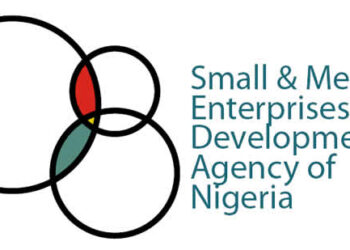Nigeria has more than 39.6 million Micro, Small & Medium Enterprises (MSMEs) contributing up to 48% of Nigeria’s GDP; and over 59 million jobs as of 2022, which is well over 84% of the total labor force in Nigeria.
Many of the MSMEs require access to capital, capacity building, access to markets, equipment, innovations, information, linkages, etc. to sustain, grow, and build their businesses into more profitable ventures.
SMEDAN in partnership with Casava, has created the Business Gro initiative under its MSME Mass Registration Program (MMRP) to provide SMEDAN-registered businesses with access to exceptional value-added services and Government benefits, such as:
SMEDAN Certificate with embedded SMEDAN Unique Identification Number (SUIN) confirming their business status.
Access to grants, loans, and other financial services through SMEDAN or in partnership with other development agencies.
Access to capacity building, training, and other business learning opportunities for the business owner and employees.
Business continuity cover against selected unforeseen circumstances impacting business operations.
Engender and fast-track market linkages, enterprise cooperation, and enhanced regulatory oversight as congruent with the vision of the agency which is to establish a structured and efficient MSME sub-sector that will encourage and enhance sustainable economic development.
The theme of this year’s celebration is Building a Stronger Future Together.” In line with this, the MSME Mass Registration Program (MMRP), launched by SMEDAN, seeks to address the challenges faced by MSMEs in Nigeria through the registration and provision of developmental benefits to informal and semi-formal MSMEs.
Owners of MSMEs can now visit https://smedanregister.ng/ to register their business with SMEDAN for free and gain subsidized access to various forms of support services.
Speaking on the initiative, the Director-General of SMEDAN, Mr Olawale Tunde Fasanya, said “SMEs are the backbone of every economy, and they face so many challenges affecting their ability to scale especially due to their unstructured nature.
SMEDAN Intends to position MSMEs for stronger and better performance as we have provided benefits to combat major setbacks faced by MSMEs, which include access to funds/credit facilities, insurance, training, etc for a small fee”, he added that “SMEDAN is fully committed to this initiative in the quest to ensure SMEs can fulfill their potential with proper guidance and exposure, avoid a business collapse that could drag business owners and employees deeper into poverty.”
Our obligation to these MSMEs is to help them grow their business and ensure they can access every necessary information, and linkages to becoming a generational business”, he concluded.
SMEDAN was established by the SMEDAN Act of 2003 to promote the development of the MSME sector of the Nigerian Economy. With a vision to establish a structured and efficient micro, small and medium enterprises sector that will enhance the sustainable economic development of Nigeria.





















This is welcoming development and in addition to that I also urge new administration to look on upgrading SMEDAN to a Ministry of MSME.
Some countries like India which is similar to Nigeria in terms of Population and large number of small businesses has Ministry of SME, we suppose to imitate every development from such countries.